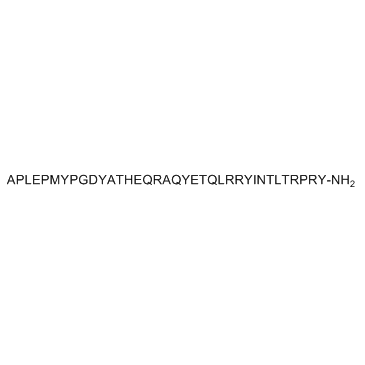Pancreatic Polypeptide (rat)

Pancreatic Polypeptide (rat) structure
|
Common Name | Pancreatic Polypeptide (rat) | ||
|---|---|---|---|---|
| CAS Number | 90419-12-8 | Molecular Weight | 4398.93 | |
| Density | N/A | Boiling Point | N/A | |
| Molecular Formula | C195H298N58O57S | Melting Point | N/A | |
| MSDS | USA | Flash Point | N/A | |
Use of Pancreatic Polypeptide (rat)Pancreatic Polypeptide, rat is an agonist of NPY receptor, with high affinity at NPYR4. |
| Name | Pancreatic Polypeptide(Rat) |
|---|---|
| Synonym | More Synonyms |
| Description | Pancreatic Polypeptide, rat is an agonist of NPY receptor, with high affinity at NPYR4. |
|---|---|
| Related Catalog | |
| Target |
NPYR4[1] |
| In Vitro | Pancreatic Polypeptide, rat is an agonist of NPY receptor, with high affinity at NPYR4. Pancreatic Polypeptide (1 μM) does not alter proliferation in BRIN BD11 or 1.1B4 beta-cells, but reverses the decreased cell viability in BRIN BD11 cells induced by streptozotocin. Pancreatic Polypeptide (0.1 nM-1 μM) shows no effect on insulin secretion from isolated mouse islets, and does not affect the membrane potential and (Ca2+)i levels in BRIN BD11 cells at 1 μM[1]. |
| In Vivo | Pancreatic Polypeptide (25 nmol/kg bw, i.p.) reduces glucose-stimulated insulin concentrations but shows no effect on acute feeding behaviour in overnight fasted mice[1]. |
| Cell Assay | To assess the effects of NPY and Pancreatic Polypeptide on rodent BRIN-BD11 and human 1.1B4 beta-cell proliferation, cells are seeded at a density of 150,000 cells per well and cultured overnight in the presence of NPY or Pancreatic Polypeptide (1 μM), and compared to positive control GLP-1 (1 μM). Cells are washed with PBS and fixed using 4% paraformaldehyde. After antigen retrieval with citrate buffer at 95°C for 20 min, tissue is blocked using 2% BSA for 45 min. The slides are then incubated with rabbit anti-Ki-67 primary antibody, and subsequently with Alexa Fluor® 594 secondary antibody. Slides are viewed using fluorescent microscope and photographed by DP70 camera adapter system. Proliferation frequency is determined in a blinded fashion and expressed as % of total cells analysed. Approximately 150 cells per replicate are analysed. For analysis of ability of NPY and Pancreatic Polypeptide to protect against streptozotocin-induced DNA damage, BRIN-BD11 and 1.1B4 cells are seeded. Cells are then exposed to streptozotocin (5 mM) in the presence or absence of NPY or Pancreatic Polypeptide (1 μM) for 2 h, with GLP-1 (1 μM) as positive control. Cells are then harvested and a comet assay is performed. Resulting gels are stained using DAPI (4′,6-diamidino-2-phenylindole) (100 μg/mL) and slides are viewed under appropriate filter. Comet score software is used for the analysis of % tail DNA (100 cells per gel) and olive tail moment[1]. |
| Animal Admin | Mice[1] Plasma glucose and insulin responses are evaluated after intraperitoneal (i.p.) injection of glucose alone (18 mmol/kg body weight) or in combination with test peptides (Pancreatic Polypeptide, etc.; 25 nmol/kg body weight) in overnight (18 h) fasted C57BL/6 mice. In a second series of experiments, 18 h fasted mice are used to assess the effects of respective test peptides on food intake. Mice receive an i.p. injection of saline alone (0.9% (w/v) NaCl) or in combination with test peptides (25 nmol/kg body weight) and food intake measured at 30 min intervals for 180 min. A dose of 25 nmol/kg is chosen with other NPYR modulators on glucose homeostasis, insulin secretion and feeding at this dose[1]. |
| References |
| Molecular Formula | C195H298N58O57S |
|---|---|
| Molecular Weight | 4398.93 |
| Personal Protective Equipment | Eyeshields;Gloves;type N95 (US);type P1 (EN143) respirator filter |
|---|---|
| RIDADR | NONH for all modes of transport |
|
Non-specific binding and general cross-reactivity of Y receptor agonists are correlated and should importantly depend on their acidic sectors.
Peptides 32 , 258-265, (2011) Non-specific binding of Y receptor agonists to intact CHO cells, and to CHO cell or rat brain particulates, is much greater for human neuropeptide Y (hNPY) compared to porcine peptide Y (pPYY), and es... |
|
|
Critical role of arcuate Y4 receptors and the melanocortin system in pancreatic polypeptide-induced reduction in food intake in mice.
PLoS ONE 4 , e8488, (2009) Pancreatic polypeptide (PP) is a potent anti-obesity agent known to inhibit food intake in the absence of nausea, but the mechanism behind this process is unknown.Here we demonstrate that in response ... |
|
|
Y4 receptors and pancreatic polypeptide regulate food intake via hypothalamic orexin and brain-derived neurotropic factor dependent pathways.
Neuropeptides 44 , 261-268, (2010) Gut-derived peptides are known to regulate food intake by activating specific receptors in the brain, but the target nuclei and neurons influenced are largely unknown. Here we show that peripherally a... |
| MFCD00081813 |
| APLEPMYPGDYATHEQRAQYETQLRRYINTLTRPRY-NH2 |
| Pancreatic Polypeptide, rat |

